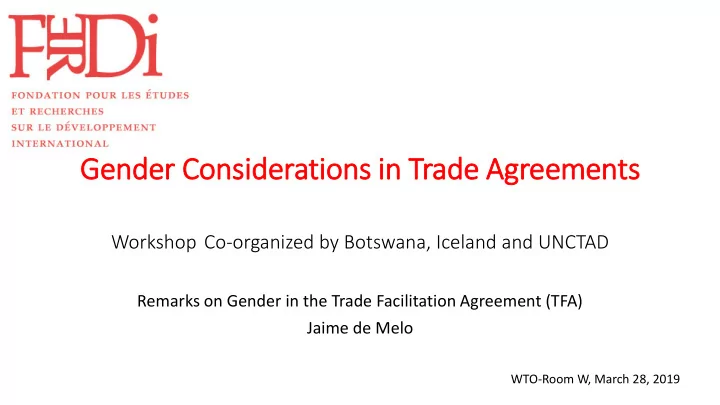

Gender Considerations in Trade Agreements Workshop Co-organized by Botswana, Iceland and UNCTAD Remarks on Gender in the Trade Facilitation Agreement (TFA) Jaime de Melo WTO-Room W, March 28, 2019
The New Face of Regionalism • Regional Trade Agreements (RTAs) no longer about an exchange of market access (at the expense of third countries) but about attracting FDI in exchange of unilateral reductions in trade barriers • Depth. Prior to 2000, 90% of RTAs notified to WTO only dealt with provisions covering trade in goods. From 2000 to 2015 64% of 194 RTAs notified to WTO include provisions on services trade. ⇒ Recognition of complementarity of goods trade and services trade: Covering labor mobility (e.g. free movement of persons protocols in African RECs), they will have an effect on gender outcomes even if protocols are gender neutral if only because trade openness can affect men and women differently because of composition effects related to changes in taxation
RTAs as forum for addressing gender issues? ▪ Discrimination or «market failures» like lack of information/awareness according to gender should first be addressed at national level. ▪ If RTAs are means to address these market failures because of the insistence of one of the partners imposing its «superior» standards/regulations, then RTAs are a way to address gender issues. ▪ The Trade Facilitation Agreement (TFA) is the first multilateral agreement since WTO in 1994. Has the promise to address gender issues, especially through the Trade Faciliation Support Programme that provides funds for developing countries.
Trade Faciliation Support Programme (TFSP) • From start, within gender-neutral approach, was the implicit assumption that TFA would have gender-positive impacts by creating more transparent and efficient trade facilitation systems. Women traders would benefit disproportionately from TFSP. • WCO [1] is working towards gender equality in customs administrations. This should help business women and women traders. It has developed a ‘WCO Gender Equality Organizational Assessment Tool’ • ITC [2]has published a study covering 20 developing countries showing large disparities between men and women participation in trade and 3 areas for improvement: (1) regulatory biases;(2) procedural obstacles; (3) cultural biases • UNCTAD [3]has published a study on women in informal cross-border trade showing that lack of awareness about trade rules and customs procedures is a main driver of informality and an impediment to move from subsistence to sustainabilty
Efficiency of TFSP • According to WB annual report for 2017-18 [4] , 3 gender assessments are about to be completed with as outcome indicators: o Number of in-country gender assessments o Percentage of female participants in events • This is a start, but not likely to be very informative • More promising: take a target population (women-owned, women- managed firms exporting/importing) and compare their performance with male-owned firms. Requires a sufficiently large sample (firms and countries) to generalize
References [1] ITC (2016) How does gender affect the participation of SMEs in international trade? Keynote by Arancha Gonzalez, Queens University, Kingston, Canada-16 October 2016, International Trade Centre: http://www.intracen.org/news/How-does-gender-affect-the-participation- of-SMEs-in-international-trade/ [2] WCO (2013) WCO promotes Gender Equality and Diversity, World Customs Organisation, http://www.wcoomd.org/en/topics/capacity- building/activities-and-programmes/gender-equality.aspx [3] UNCTAD (2019) Borderline: Women in informal cross-border trade in Malawi, the United Republic of Tanzania and Zambia, https://unctad.org/en/PublicationsLibrary/ditc2018d3_en.pdf [4] World Bank (2018) Annual Report 2017-2018: Trade Facilitation Support Programme , World Bank.
Recommend
More recommend